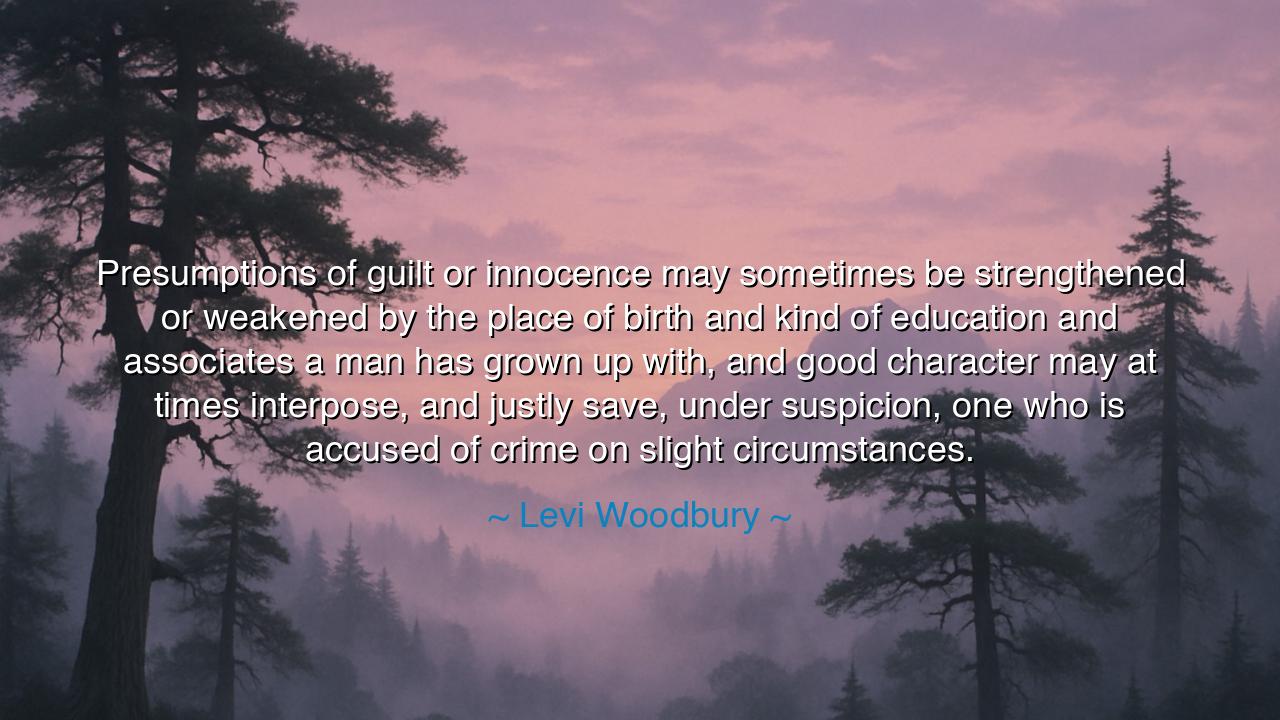
Presumptions of guilt or innocence may sometimes be strengthened
Presumptions of guilt or innocence may sometimes be strengthened or weakened by the place of birth and kind of education and associates a man has grown up with, and good character may at times interpose, and justly save, under suspicion, one who is accused of crime on slight circumstances.






Levi Woodbury, a statesman and jurist of the young American republic, gave voice to a timeless reflection when he said: “Presumptions of guilt or innocence may sometimes be strengthened or weakened by the place of birth and kind of education and associates a man has grown up with, and good character may at times interpose, and justly save, under suspicion, one who is accused of crime on slight circumstances.” In these solemn words, he speaks to the fragility of justice and the weight of reputation, reminding us that men are not judged only by evidence, but also by the shadows of their background, their character, and the company they keep.
The origin of these words is found in Woodbury’s service as a Justice of the United States Supreme Court in the nineteenth century, a time when the young nation grappled with questions of liberty, fairness, and law. He understood that human judgment is never free from the influence of perception. A man of noble character might be spared suspicion where another of low reputation might be condemned. Likewise, a man born in privilege and educated among the respected may find his innocence more readily believed than one raised in poverty, among rough companions. His warning is both practical and moral: appearances shape justice, yet true character can shine through and protect the innocent even under suspicion.
History offers many vivid illustrations of this truth. Consider the trial of Socrates in ancient Athens. His associates—the young men he taught—were seen by many as dangerous in their questioning of tradition. Though the charges were slight, suspicion was fueled not only by his words but by the education he had imparted to others. The presumption of guilt was strengthened by the place and company he kept. Yet his enduring character, calm and unwavering even in death, has preserved him through the centuries as innocent in spirit, even though condemned by men.
Another example may be found in the case of Alfred Dreyfus, the French officer accused of treason in the late nineteenth century. He was condemned not by strong evidence, but because of his birth as a Jew in a time of fierce prejudice, and the suspicion attached to his associates. Here, Woodbury’s words are seen in tragic form: the presumption of guilt was unjustly strengthened by origin and circumstance. Yet, in time, the truth prevailed, and the force of character, both of Dreyfus and of those who defended him, overcame suspicion and restored justice.
The deeper meaning of Woodbury’s reflection is that justice is not blind unless men strive to make it so. Human beings are ever tempted to judge not only the act, but the man—his birthplace, his schooling, his companions. This can lead to injustice, for such things may cast shadows that obscure the truth. Yet, he reminds us that good character, lived out consistently, can be a shield, preserving the innocent from false accusation. Character is a fortress that even suspicion struggles to overthrow, for it is built over years by honesty, integrity, and service.
The lesson for us is twofold. First, guard your character, for it is a silent advocate in times of trial. Reputation may tip the scales when evidence is thin. If your life has been marked by honesty, generosity, and justice, these may rise to defend you when words cannot. Second, be cautious in judging others. Do not let their birth, their education, or their associates blind you to the truth of their situation. Judge with fairness, lest you condemn the innocent or excuse the guilty.
Practical action is within reach. Build your character daily by choosing truth over lies, humility over pride, and justice over convenience. Surround yourself with noble associates, for their lives will reflect upon your own. And when called to judge others—whether in courts, in communities, or in private thought—remember Woodbury’s wisdom: beware the presumptions born of prejudice, and let character and evidence, not suspicion alone, guide your decision.
Thus Levi Woodbury’s words stand as a warning and a guide: that justice is delicate, easily swayed by perception, but steadied by character. Let us then live in such a way that, if ever suspicion should fall upon us, our lives themselves may rise to speak on our behalf. For though birth and circumstance may shape how others see us, it is character that ultimately saves or condemns.






AAdministratorAdministrator
Welcome, honored guests. Please leave a comment, we will respond soon